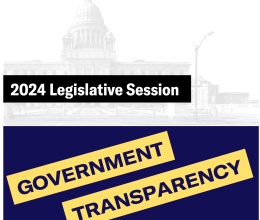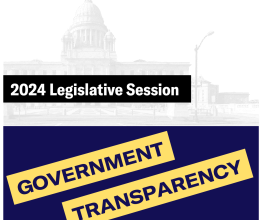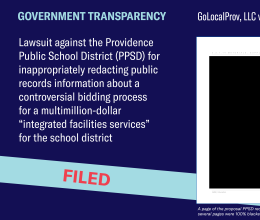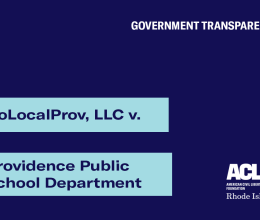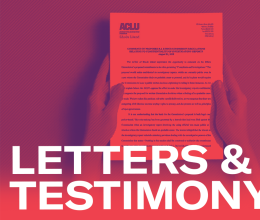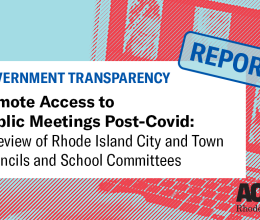In papers filed today in Superior Court, the Rhode Island ACLU has labeled as “downright Orwellian” arguments being made by the Barrington School Committee in seeking to dismiss an open meetings lawsuit that The Barrington Times and the ACLU filed against the public body in August. The suit argues that the School Committee unlawfully met in closed session last year to discuss the merits of instituting a mandatory breathalyzer policy for students attending school dances. The suit further charges that school committee agendas, by using “vague boilerplate terminology,” routinely fail to specify the nature of the business to be discussed at meetings. The school committee has justified its secret meeting by citing the open meeting law’s “litigation” exemption, pointing to a letter that the ACLU had written two months before the meeting that raised policy concerns about breathalyzer tests of students.
Responding to a motion made by the school committee to dismiss the suit, R.I. ACLU volunteer attorneys Howard Merten and Keith Fayan note in a 30-page brief filed today that “at the time the [ACLU] letter was written, litigation was not even possible. There was no drafted — much less adopted — policy to challenge in court. Indeed, the Committee stated at the very meeting in which it claims there was a possible threat of litigation warranting a secret session that no decision had been made as to whether the Committee would even adopt any policy.”
The ACLU’s brief argues that to allow the school committee to characterize public input such as that offered by the ACLU as a threat of litigation, especially when no litigation is even possible, and then use it as the basis to meet in secret “would turn the Open Meeting Act on its head. An act designed to facilitate public discussion would turn into a mechanism to avoid it.”
As for the school committee’s defense of its inadequate agenda notices, the ACLU brief notes that the school committee routinely listed “Discussion School Committee Policies” as an agenda item without providing any details as to what policies would actually be discussed. In fact, argues the brief, “the Agenda items listed are not only rote, vague and repetitive, they are more often than not inaccurate. Routinely, broad topics are listed that never get discussed. Other actions are taken … that were never mentioned in the Agenda. The Agenda and Notice requirements of the [statute] are not meant to be boxes to check so that a public body has the necessary ‘cover’ to discuss whatever might or might not come up at a particular meeting.”
The breathalyzer issue was a subject of great debate in the town and, in fact, the closed session took place on the same night the school committee heard public comment on the idea. However, nothing on the committee’s agenda indicated that a possible new breathalyzer policy would also be a matter of private discussion that night. The Barrington Times filed a complaint with the Attorney General after learning of the secret meeting, but that office found no violation of the law.
The school committee’s motion to dismiss the ACLU case is scheduled to be heard in Superior Court next Tuesday, January 12th.

